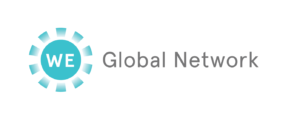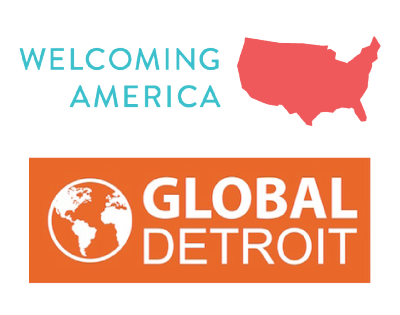Ideas that Innovate
As an increasing number of Rust Belt communities realize the enormous contributions that immigrants make to local economic growth and prosperity, new and innovative economic development initiatives are being launched to build more inclusive and welcoming economies. These initiatives often include a number of programs that facilitate immigrant entrepreneurship, talent inclusion, welcoming work, and other elements. As rapid as these local programmatic initiatives are being launched, innovations also are being pursued by state and local public policymakers.
Thus, the Welcoming Economies Global Network has launched Ideas that Innovate to create a collection of state and local public policies that further our efforts to pursue immigrant economic development strategies. Explore the full collection of ideas here.

Featured chapter: Advancing corporate partnerships to include immigrants in mainstream economic development strategies
What does it mean?
In Cincinnati, Detroit, and St. Louis, local chambers of commerce or economic development agencies have played a critical role in the development of local immigrant economic development initiatives. The affiliation between immigrant economic development initiatives and chambers of commerce, economic development agencies, and business groups is instrumental in expanding mainstream economic development agendas to encompass the needs and future contributions of immigrants.
St. Louis Mosaic Project demonstrates the positive impact that can be achieved when corporate leaders, chambers of commerce, economic development agencies, and other conventional actors fully endorse the inclusion of immigrants in a regional economic development strategy. In 2012, The William T. Kemper Foundation funded a study, “Immigration Recommendations for St. Louis Region: How can we Jump-Start Growth?” Led by Dr. Jack Strauss of Saint Louis University, it paved the way for the St. Louis Mosaic Project. This study explored local demographic trends and potential levers for population growth, as well as posed a set of recommendations provided by Dr. Strauss in 2013 to turn the tide of population decline. Bob Fox, owner of the St. Louis-based business New Space and a strong believer that immigrants have a critical role to play in spurring growth, was an avid proponent of the study. Fox was instrumental in the development of a steering committee drawn together to consider the research and recommendations put forth by Strauss.
The steering committee was comprised of members from the business community, universities, nonprofit agencies, financial institutions, and the quasi-public regional economic development initiative, the St. Louis Economic Development Partnership (the Partnership). The steering committee ultimately hired Betsy Cohen, formerly Vice President of Marketing at Nestlé Purina North America, to establish and direct a regional office to convene, coordinate and initiate immigrant economic development strategies. Housed at the Partnership, St. Louis Mosaic Project has pursued a variety of programs in partnership with the St. Louis Regional Chamber, the Regional Business Council, the Partnership, and Civic Progress St. Louis. Each of these mainstream economic development and business organizations has a representative on the St. Louis Mosaic Project steering committee.
Key Successes with Steering Committee Members
St. Louis Economic Development Partnership is dedicated to publicly championing immigrant economic development and broadcasting its economic benefits. As a component of the Partnership, the work of St. Louis Mosaic Project is promoted in newspaper articles, public speeches, and other correspondence from the Economic Development Partnership. With the message coming directly from a regarded leader in St. Louis’s economic development sector, the Economic Development Partnership helps to strengthen the credibility of St. Louis Mosaic Project’s work.
The St. Louis Regional Chamber, led by its President and CEO Joe Reagan, is prioritizing strategies to attract new businesses and companies to the area with an emphasis on St. Louis talent and education assets. The Regional Chamber considers the inclusion of immigrants critical to the success of its attraction strategy. In fact, one of the Regional Chamber’s pillars in its talent and inclusion agenda boldly states full partnership with and support of St. Louis Mosaic Project’s goal to become the fastest growing U.S. metro area for immigration by 2020. A key success of the Regional Chamber and St. Louis Mosaic Project partnership is
the St. Louis Mosaic Project’s Professional Connector Program, which introduces high-skilled immigrants and African Americans in St. Louis to well-known local “connectors” for a cup of coffee and career networking referrals. With a direct connection to corporations through its steering committee and other programs, St. Louis Mosaic Project easily identifies connectors, while it also works with universities and through other business channels to find newcomers in need of “connecting.” The Regional Chamber helps execute the operations of this program, thereby increasing St. Louis Mosaic Project’s capacity, and ensuring improved access for immigrants and African Americans to networking opportunities in St. Louis. As a result, Mosaic Project is presented by the Chamber as an important project for economic development. This key partnership helps those in the region understand that the Regional Chamber is welcoming and that inclusion is an important part of their strategy.
In addition, Anna Crosslin, the President and CEO of the International Institute of St. Louis which annually serves 7,000 immigrants and refugees, sits on the Regional Chamber Board and connects the Institute workforce programs with employment in the region.
The Regional Business Council, a consortium of Presidents and CEOs from 100 of the region’s largest mid-cap companies collaborates with St. Louis Mosaic Project on strategies designed to increase retention of international students. C-Suite executives become Regional Business Council mentors and are matched with international and minority university students. St. Louis Mosaic Project is responsible for a steady increase of international students participating in the Mentor Network and hosts a business etiquette training specialist who annually serves 90 international students, helping to improve soft skills and prepare students to prosper in the U.S. business culture.
Civic Progress is an organization of CEOs from the St. Louis region’s largest private sector employers working to improve the quality of community and business life in the region. Through a partnership with the chair of the Civic Progress Entrepreneurship Committee, David Kemper, Chairman and CEO of Commerce Bancshares, Inc., St. Louis Mosaic Project instituted an award for local immigrant entrepreneurs. Part of an existing effort by Start-Up Connection’s annual competition and award ceremony, the Bright Future Entrepreneurial Inclusion award now includes a Commerce Bank-sponsored award for “Mosaic Immigrant Entrepreneur” which presents $5,000 to an immigrant entrepreneur company. St. Louis Mosaic Project and Civic Progress have also provided scholarships to three immigrant entrepreneurs for participation in a 12-month business development program designed to help immigrant business owners better understand the fundamentals of building a business.
The Hispanic Chamber of Commerce and the Asian-American Chamber of Commerce work closely with St. Louis Mosaic Project to promote programming and networking that is inclusive of immigrants across the region.
Why does it matter?
When the message that immigrants are good for the economy comes from known and respected players in the corporate community, it is elevated into normative discourse, thereby helping to foster a culture in which immigrants are valued. Seated within the quasi-public sector and supported by the business community, St. Louis Mosaic Project is uniquely positioned to advance the message that immigrants are good for the economy through the very voices that are trusted to drive growth in St. Louis. St. Louis Mosaic Project’s partnerships with chambers and economic development agencies have also tapped into opportunities to expand existing and create new programming which is inclusive of immigrants. These partnerships are powerful drivers to increase awareness among key decision makers of what immigrants can do for local economies and foster more inclusive leadership development, talent attraction and retention, and employment strategies within the traditional economic development sector.
Resources for Action
The St. Louis Mosaic Project is part of the Regional Chamber’s 2017 Strategic Plan.



